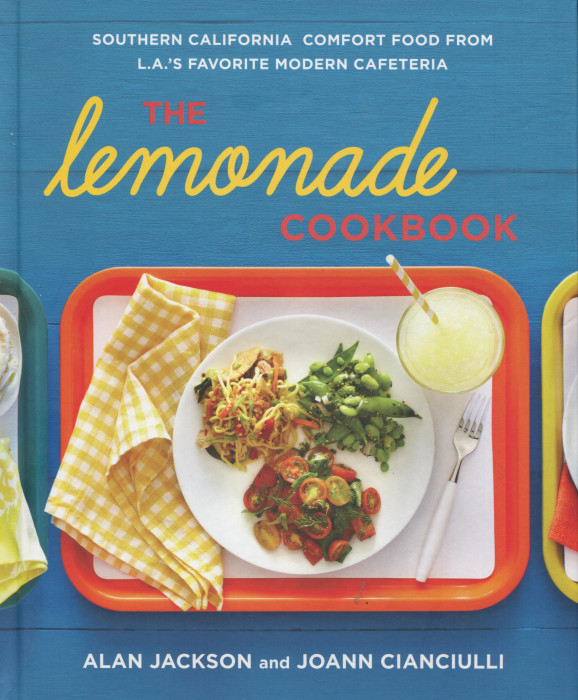A long time ago, before “fast food,” America had thousands of cafeterias scattered across its cities. The first cafeteria [“coffee shop” in Spanish] appeared in the 1893 Chicago World’s Columbian Exposition. Five years later the idea of having trays and a trays line was introduced in New York by the Childs chain. Starting in the 1960’s cafeterias — college food service excepted — began to die away, overcome by first fast food chains and then, yes, coffee shops.
In the culinary world, what goes away often returns, bigger, better and bolder. Alan Jackson is a native of Southern California, a chef, a founder of his new modern cafeteria chain Lemonade, and now an author. Here he teams up with Joann Cianculli, a top television producer and cookbook author who has worked with such celebrities as Tyler Florence and Michael Mina, and been a guest critic on Bravo's Top Chef Masters.
In just a few years, Alan has spread the word about his personal version of Southern California Cuisine — yes, not California but Southern California cuisine. His Lemonade cafeterias dot all across the counties of Southern California and extend to another dessert, too: two outlets are already in the Middle East.
The food at Lemonade is the food of a modern deli with a veggie focus. The vegetables rotate across the seasons. The dishes are not vegetarian but vegetable-centric. There is meat here but often literally as an ingredient to intensify the central veggie aspects of a dish. The food is quick to prepare, sophisticated, and wonderfully different.
The book is divided into 10 chapters. Some, like Pot Roast Sandwiches, are “traditional” to the cafeteria/deli style. Yes, it’s a chicken sandwich but one with manchego cheese and fresh fig jam. There is chapter of Semi-Traditional Sandwiches where the imagination flies:
Caesar club with turkey, ham, and tomato
Chicken with beet, apple, goat cheese, and honey
Citrus-Poached Salmon Salad with snap peas, cucumber and green goddess dressing
Salad dressings and vinaigrettes and sauces are the foundation for the creativity in this book. Suzen and I made the Seared Ahi Tuna with Crushed Orange Ponzu Sauce. Tuna is tuna, and lovely, but it is that ponzu sauce that makes the dish. Sweet and sour and penetrating. The sauce is ideal for many other meals with poultry or fish.
The Marketplace Vegetables chapter offers “just” veggies with specially matched vinaigrettes. Vinaigrettes galore in fact: hazelnut, sherry, curry, champagne, ancho chili, lime, pistachio, lemon-saffron, Vidalia onion and bacon, kumquat, even fermented black bean, lemon-truffle, red pepper, lime and creamy sesame vinaigrette.
You can enjoy those vinaigrettes in the veggie dishes offer up here, including:
Soba noodles, kimchi vegetables and creamy sesame vinaigrette
Fingerling potato with dill and lemon-saffron vinagrette
Butternut squash, chives and lemon-truffle vinaigrette
Or, you can do the obvious mix and match. Employ these vinaigrettes with the vegetables of your choice. You could even default to standard old lettuce, tomato, and onion to test the transformative power of, say, ancho chili vinaigrette.
Besides the Marketplace chapter, there are ones for Marketplace Vegetables + Legumes + Grains and Marketplace Vegetables + Protein. Here you’ll find more complex ideas:
Beluga lentil with quinoa, persimmon and voodoo vinaigrette [don’t worry, it is just curry, cumin, turmeric, cilantro, basil, mirin, rice vinegar, agave, shallots, cloves, nutmeg, cloves, salt and pepper!]
Rice pilaf with nectarines, white cheddar and mint vinaigrette
Tandoori chicken with mango, coconut and tamarind vinaigrette
Smoked salmon with watercress, cucumber, bagel croutons, and horseradish dressing
The secret to Lemonade is an all-out assault on your palate. Flavor combinations barge across your senses. It’s a flood of satisfaction. A bit over the top? Perhaps, but you get this feeling of being treated to so many good flavors all at once.
We don’t all enjoy the Southern California climate year round. But now, for all of us, summer is here and the fruits and vegetables abound. The Lemonade Cookbook is one to just keep on your kitchen counter. Leaf through the pages, look at what you just got at the farmers market, and enjoy something complex and satisfying.
Your town or city may no longer have a cafeteria. It may have morphed into clothing store or now sell tires. But you have your own private cafeteria alive and waiting in The Lemonade Cookbook.
Look in the coming weeks for a couple of posts of these powerful recipes, including that tuna with the ponzu sauce.

